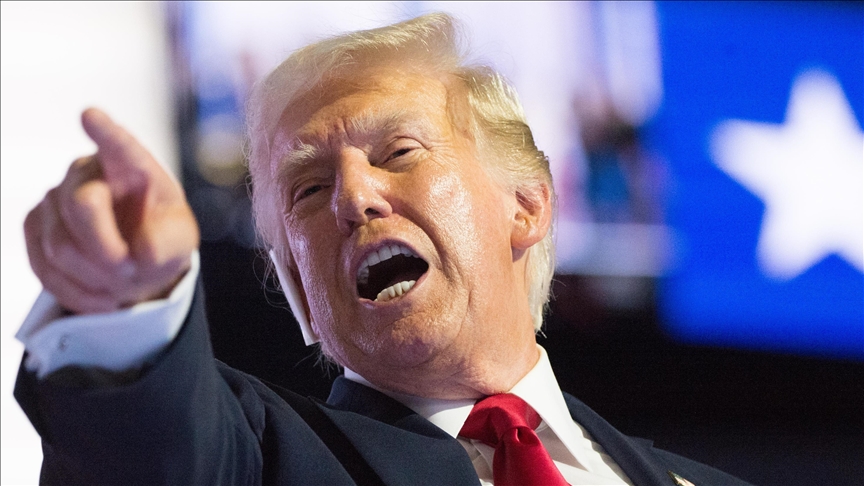Trump's 2nd presidency: A turning point for US domestic and global policies
Donald Trump set to face complex domestic, foreign policy issues when he takes office in January

NEW YORK
The Jan. 20, 2025 inauguration day marks a critical turning point for the US, as Republican Donald Trump, having won the 2024 presidential election, is set to return to the White House, inheriting a range of unresolved domestic and international issues that will significantly shape his presidency.
Domestic challenges: Economic struggles and immigration reform
Upon taking office for his second term, after four years away, Trump will confront the lingering economic fallout from the COVID-19 pandemic. Inflation and high unemployment – though now considerably lower than their highs during the pandemic – and a stagnating housing market remain key issues, with political leaders continuing to blame each other.
The rising cost of living is a critical concern for many Americans, who are also grappling with the effects of an uneven recovery.
Another major challenge lies in the ongoing immigration crisis. The debate over irregular immigration has polarized US politics, with Democrats advocating more humane measures, while Republicans argue that stricter controls are necessary to safeguard national resources.
The debate over gun rights also remains a flash point, with conservatives defending the right to bear arms, while progressives push for tighter restrictions in response to rising gun violence and deaths, including many schoolchildren.
Additionally, the contentious issue of abortion rights continues to divide the nation, with recent legal battles and state-level restrictions escalating tensions.
Foreign policy: Navigating global tensions
Trump’s foreign policy agenda will also be burdened with significant challenges. The ongoing Israeli-Palestinian conflict, particularly the violence in Gaza, continues to be a major international issue.
As the US has been a staunch ally of Israel, its extensive military aid and defense of Israel at the UN have drawn sharp criticism. Trump will be looked at to balance support for Israel with growing calls for peace and humanitarian aid to Gaza.
The war in Ukraine remains another contentious issue. While the US has provided substantial military aid to Ukraine in its fight against Russia, the prolonged conflict, compounded by Russia’s alliances with Iran and North Korea, presents an ongoing diplomatic and military challenge.
China’s growing economic and military power is a priority for both political parties in the US, with the Biden administration seeking to counter China's influence through regional alliances.
The US has worked alongside India, Japan, South Korea, and Australia in a strategic bloc called the Quad to challenge China's rise.
Turkish-US relations: Key tensions and critical discussions
In terms of foreign relations, the US will need to navigate complex issues with NATO ally Türkiye. One of the main points of contention is continued US support for the terrorist group PKK/YPG in Syria, which Türkiye views as a threat to its security.
Despite Türkiye's objections, the US tries to justify its support as part of the fight against terror group Daesh/ISIS. Türkiye says using one terror group to fight another makes no sense.
In its 40-year terror campaign against Türkiye, the PKK – listed as a terrorist organization by Türkiye, the US, and EU – has been responsible for the deaths of over 40,000 people, including women, children, and infants. The YPG is PKK's Syrian offshoot.
The US also faces diplomatic friction with Türkiye over sanctions imposed under the Countering America’s Adversaries Through Sanctions Act (CAATSA) for Türkiye’s purchase of the Russian S-400 missile defense system.
Türkiye has called for the removal of these sanctions, calling them unfair and unjustified, but the US has yet to respond.
Additionally, Türkiye’s exclusion from the F-35 fighter jet program due to the S-400 purchase has left a $1.45 billion financial dispute unresolved.
Türkiye also continues to press the US for the extradition of individuals linked to the Fetullah Terrorist Organization (FETO), following its defeated 2016 coup attempt – which killed over 250 people – but Washington has not acted on these requests.
A key issue for both NATO allies is the sale of F-16 fighter jets to Türkiye, which has received congressional approval but is still awaiting a smooth transfer process.
Furthermore, Türkiye has condemned unconditional US support for Israel amid the ongoing genocide in Gaza – which has taken over 43,000 lives – and called for the US military aid to Israel to end.
Türkiye is also urging the US to lift its arms embargo on the Greek Cypriot Administration.
As Trump prepares to take office, the weight of these pressing issues will define his early days in office and could shape the course of US domestic and foreign policy for years to come.
*Writing by Gizem Nisa Cebi in Istanbul








